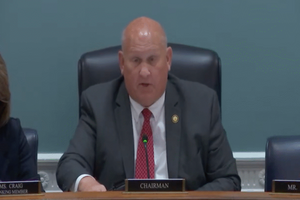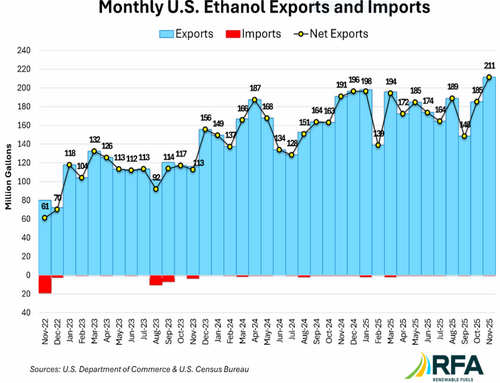| House Ag Committee Chair Glenn ‘GT’ Thompson speaks at the Prop 12 hearing on Wednesday, July 23. |
By Ryan Hanrahan, University of Illinois’ FarmDoc project
Reuters’ Leah Douglas reported that “Republicans continued on Wednesday a years-long effort to override a 2018 California law that bans the sale in the state of pork from pigs kept in tightly confined spaces, arguing in a House Agriculture Committee hearing that the law is overly burdensome to farmers.”
“Proposition 12, which also sets housing standards for veal and eggs sold in the state, was upheld by the Supreme Court in 2023 after a legal challenge by the pork industry,” Douglas reported. “President Donald Trump’s administration sued California on July 9 over the law’s provisions for chicken housing, arguing it has contributed to higher egg prices.”
“Committee Chair Glenn ‘GT’ Thompson has sought to limit the law’s scope to California farmers, excluding farmers from other states who sell pork into California, in the next farm bill. The bill is an omnibus funding package passed every five years, and which is two years overdue,” Douglas reported. “‘The cost of compliance for small producers could actually push them out of the market altogether, leading to further consolidation in the industry,’ Thompson said in Wednesday’s hearing.”
“The average cost of retrofitting or rebuilding barns to meet Prop 12’s standards is about $3,500 to $4,500 per sow, according to a letter sent from Agriculture Secretary Brooke Rollins to Thompson on July 21 and released by the agriculture committee,” Douglas reported. “…Some hog farmers and pork companies oppose overturning the law, as they have already made investments to comply.”
USDA Data Shows Prop 12 Has Increased Pork Prices in CA
Politico’s Grace Yarrow reported that “new USDA data reveals that California’s landmark animal welfare law drove up pork prices for consumers and disproportionately affected small farmers, a finding that gives Republicans ammunition in upcoming farm bill negotiations.”
“The data, shared with the House Agriculture Committee and obtained by POLITICO, shows that 27 percent of U.S. pork producers have made or are working to make investments to comply with California’s Proposition 12, which created confinement requirements for any hogs that are sold or raised in the state,” Yarrow reported. “Retail pork prices in California increased by nearly 19 percent in June compared with the same month last year, USDA found. A study conducted by the department in May found that California’s low-income families reduced their pork purchases by 22 percent since the law’s implementation on Jan. 1, 2024.”
National Hog Farmer’s Ann Hess reported that “according to National Pork Producers Council Economist Holly Cook, scanner data shows that these trends continue to hold today, with retail prices in California still 20% higher than before the Farm Animal Confinement Initiative took effect. With total sales volume down by double digits, Cook said this means Californians are not only spending more but consuming less pork.”
“While Californians are seeing the impacts today, one study found that if the entire industry were required to adopt a system like Prop 12, it would reduce total U.S. consumer welfare by $41 billion over 15 years, disproportionately impacting price sensitive high pork consuming households,’ Cook testified Wednesday before the full House Agriculture Committee on the implications of Prop 12 for farmers and food prices,” Hess reported.
What’s Next in the Prop 12 Fight?
Yarrow reported that “Thompson (R-Pa.) and other Republicans are eager to use the farm bill to create equal standards for agricultural interstate commerce, even as environmental groups and Democrats warn that reversing state laws would weaken protections for animals and undermine states’ authority. President Donald Trump promised during his campaign that he’d oppose any state law that ‘hurt American farmers in other states.'”
Thompson “said in a brief interview Monday that he’s looking to include a slimmed-down version of the ‘Food Security and Farm Protection Act’ (previously the “EATS Act”) — which blocks states from creating their own agriculture requirements — in the farm bill. Thompson included similar language in the House GOP-led farm bill last year that advanced out of committee with support from four Democrats,” Yarrow reported. “‘We’re not looking to interfere with any state rights or state legislation,’ he said. ‘It’s got a lot of support.'”
“Thompson is working to release draft text for a farm bill package in September,” Yarrow reported.



